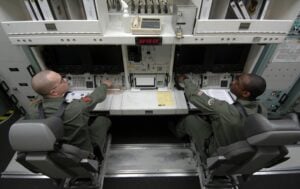
Deborah Lee James
PENTAGON: Deborah Lee James came to the Pentagon and faced a trial by fire. Within a month of her confirmation, a major scandal involving cheating by nuclear missile troops threatened to further tarnish the Air Force’s image and to raise fundamental questions among America’s allies about our ability to provide the nuclear umbrella they all depend on.
The brand-new SecAf stepped up, appearing before the press for the first time to detail just how the service would cope. She impressed most of us with her tone, command of detail, and calm demeanor.

Air Force missileers.
So in what was probably my last interview with her in the Pentagon, I asked her what she’d tell her (as et unnamed) successor in the incoming Trump Administration.
“The first thing I would say is, you think you know everything, but beware the unknown unknowns,” she said. “You’ll have an agenda of things you’ll begin working on and, boom, real life will intervene.”
That was her experience with the nuclear scandal, which became her entire world for months and months.
Overall, she urged her successor to play close attention to nuclear issues, space, and cyber threats. Of those, cyber threats are the likeliest to offer a game-changing and unanticipated threat, James said.
Top of the list: keep America informed of what’s going on in the department. “Bad news never gets better with age. If it’s good news or bad news, make sure you talk to the Congress first, and then to the media,” she said. Going public may hurt, she said, but ir hurts less in the long run than trying to keep things under wraps.
I asked what her biggest surprise was after her first 18 months in the job. While there was no Ah-Ha! moment, her visits to Air Force bases around the world, combined with what then-Air Force Chief of Staff Mark Welsh and other senior leaders were seeing and hearing, convinced them the service just didn’t have enough people to do all its jobs well.
Adding people to the service at a modest but persistent rate needs to keep happening, she said. The final House-Senate compromise version of the annual defense policy bill for 2017 would authorize 4,000 more airmen, mostly maintainers.

An A-10 “Warthog” firing its infamous 30 mm gun.
One of the most controversial issues James dealt with during her tenure was the service’s plan to retire the A-10 Warthog ground attack plane. Congress — prodded hard by departing Sen. Kelly Ayotte, whose husband flew A-10s — stopped this in its tracks, but it was clear from the outset that senior Air Force leaders really believed they had made a sound decision in the face of sequestration and the Budget Control Act.
So I asked James if she would recommend to her successor that he again consider retiring the Warthogs. Her answer: yes, if Congress does not scrap the BCA. That, of course, is one we’ll just have to watch. It also illustrates the uncertainty and difficulties imposed on Pentagon planners and leaders by the continuing inability of Congress to execute its most fundamental duties.
What will James do when she leaves the building? She’s not sure, but it may tend more to the non-profit side than to industry. First task on leaving the building: sleep and hit the beach. She deserves it.








